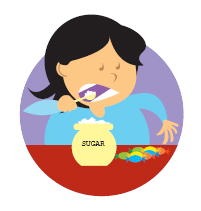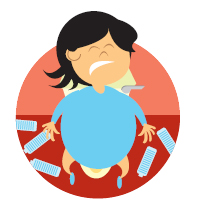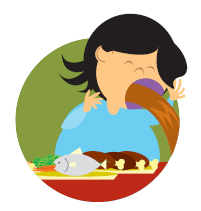What you eat during pregnancy, baby is ‘eating’ as well. If you eat an unhealthy diet that contains too little or too much of certain nutrients, your baby could be affected.
“I think every mother knows that she has to watch what she eats,” says Tey Wan Chee, who has her hands full with her 12 month-old baby girl and another on the way. “But to tell you the truth, I didn’t do anything drastic about my eating habits. You just have to make sure you don’t simply stuff junk into your mouth.”
“The only thing is that my mum makes me do is to drink lots of milk. If I don’t feel like drinking milk, she makes me eat cheese – I think she’s worried about my calcium!” laughs Wan Chee.
PREGNANCY WOES
Wan Chee is right. Most mothers already know that eating well is the foundation for a healthy pregnancy.
The real problem is when the ‘quirks’ of pregnancy get in the way. Nausea, cravings and old wives’ tales suddenly crowd your world of food, turning it upside down. Who should you listen to? Most importantly, what can you do? Here are some tips:
The sight and smell of food makes me throw up. All I eat is plain bread!
It will be hard to find any food that does not bring on nausea or vomiting (known as ‘morning sickness’). However, an empty stomach will make it worse. Eat several small meals throughout the day, instead of three big ones.You need low-fat, bland foods that can be digested easily, such as plain rice, toast, boiled potatoes, cereals, soft fruits and clear soups. Steer clear of fatty or fried foods. For relief, take some ginger ale, ginger tea, isotonic drinks, plain tea or cold barley water.
I want to eat sugar. All the time.
Sugar is just one example. Some women crave pickles, achar, chocolate, chilli and other foods they have never craved before. There is no harm in a little indulgence, but do not go overboard and eat only that one food at the expense of a variety of other foods.

I drink so much water, yet I’m still constipated.
Your bowel movements are bound to be affected with a baby sitting on your intestines.You’re right to drink lots of water.You can also get fluids from unsweetened juices and soups. Eating more fibrerich foods will also prevent and alleviate constipation. Foods like cereals, wholegrain bread, vegetables and fruits (particularly prunes) are good for you.

My mother-in-law keeps giving me food. She says I’m “eating for two” now.
No, you should not “eat for two”. Gaining too much weight during pregnancy causes health problems for you and your baby.You will also find it hard to lose weight after delivery. As a rule of thumb, if you were of normal weight before pregnancy, you should gain an overall of 12-16 kg.
I’ve been told to avoid ‘cold’, ‘windy’, ‘heaty’ and ‘poisonous’ foods. Is there anything left to eat?
These are traditional beliefs that have not been scientifically proven. However, if these beliefs (eg not eating chilli, pineapple or drinking coconut water) bring you a measure of comfort, following them is not likely to do any harm.Do not go to extremes and cut out foods that provide important nutrients.
Baby Needs To Eat!
Key nutrients and the roles they play:
| Nutrient | For mom | For baby |
| Carbohydrates | Provides energy for all the changes taking place in your body. | Provides energy for processes that enable baby to grow, such as making new cells and transporting nutrients across the placenta. |
| Protein | Builds new tissues. Also builds new blood, enzymes and hormones. | Builds baby’s muscles, tissues, hormones, enzymes, blood and antibodies. |
| Vitamins (especially A, B-complex, C and D) | Builds body stores so that you have enough to nourish yourself as well as baby. | Supports many functions and processes required for baby to grow. |
| Minerals (especially calcium and iron) | Builds body stores so that you have enough to nourish yourself as well as baby. | Calcium builds baby’s bones and teeth. Iron builds sufficient blood supply for baby and the placenta. |
Principles To ‘Eat’ By
Want to eat well, but have no idea where to start? Ask yourself some of the following questions.
Eat a balanced diet
- Am I choosing foods that provide different types of nutrients?
- Am I eating plenty of fruits and vegetables?
- Do I have more carbohydrates, less protein and even less fat in each meal?
Try something different every day
- Didn’t I have this yesterday, the day before and the day before that?
- Have I tried all the different varieties of vegetables, fruits, cereals, beans, etc etc etc?
- Why bore myself with the same food every day?
Plan your meals
- What do I feel like eating this week?
- How can I make those meals more nutritious (add more vegetables) or healthier (cook with less oil)?
- Are expensive foods necessarily worth it?
Don’t give yourself food poisoning
- Are my foods fresh, properly cleaned and well-cooked?
- Should I eat at a roadside stall that serves uncovered food?
- Could I eat a simple homecooked meal instead of eating out?







Comments